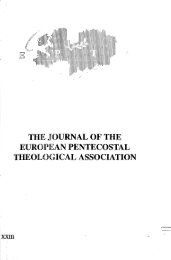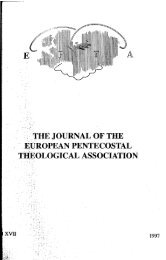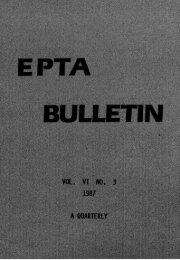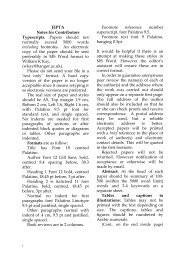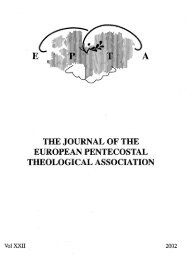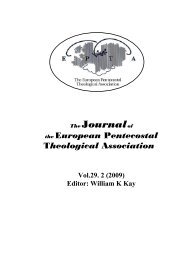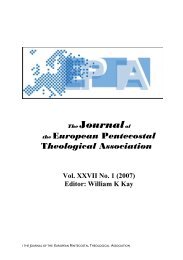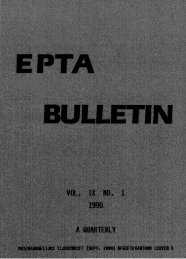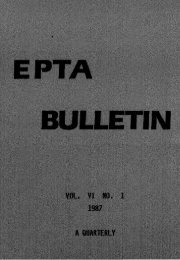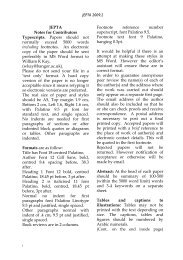jepta 2001 21 - European Pentecostal Theological Association
jepta 2001 21 - European Pentecostal Theological Association
jepta 2001 21 - European Pentecostal Theological Association
Create successful ePaper yourself
Turn your PDF publications into a flip-book with our unique Google optimized e-Paper software.
The Journal of the <strong>European</strong> <strong>Pentecostal</strong> <strong>Theological</strong> <strong>Association</strong>, Vol. XXI, <strong>2001</strong><br />
elements of the reality which is the Church.' In this way, the Roman Catholic<br />
Church, while recognizing the existence of other Churches (and thereby their<br />
legitimacy), is able to maintain its place of primacy in her understanding herself.'<br />
'Primacy' is a notion that belongs to the texture of hierarchical thinking. Within<br />
this type of thinking, it is important that the bond with the primus - the source of<br />
authority - is maintained. Within the context of the Catholic Church, this means<br />
that the communion with Rome is maintained and the primacy of the Pope is<br />
recognized and honoured.' Within the logic of this hierarchical conception of the<br />
Church, these conditions are not trivial; they are part and parcel of the Catholic<br />
conception of what the fullness of the Church is.<br />
I am well aware of the fact that the way these things are formulated here is<br />
perhaps somewhat crude. The language in Roman Catholic documents usually<br />
exhibits a high degree of intellectual sophistication and theological refinement,<br />
expressing many shades of nuance. But underneath all the sophistication and<br />
refinement, there is a deep-seated conviction: After all is said, the Roman<br />
Catholic Church is still the mother-Church, and the other ecclesiastical<br />
communities - at least in the West - are regarded as ~ffspring.~ That conviction is<br />
authenticJ and commands our respect, even when we di~agree!~ When we enter<br />
I Unitatis Redintegration, / 3.<br />
Lumen Gentium, / 8 and Unitatis Redintegration,/3. The word used here in Latin is subsistio<br />
['subsists'] rather than esse ['is'], which is much stronger.<br />
The 'primacy' of the Pope seems to be of greater importance to the operation of the Catholic<br />
Church than the doctrine of infallibility. Is it too farfetched to suggest that this doctrine was<br />
promulgated at the lSt Vatican Council to buttress the primacy of the Pope after the bleak years<br />
for the papacy in the late lath century and the immense popularity since the time of the<br />
Restoration subsequent to Napoleon's final defeat Note that the fathers of the Second Vatican<br />
Council recognize that ecumenism is not a veiled way of 'bringing schismatics back into the<br />
fold': "[ ...I it is evident that the work of preparing and reconciling those individuals who wish<br />
for full Catholic communion is of its nature distinct from ecumenical action" (Unitatis<br />
Fedintegration, / 4).<br />
See "Perspectives on KoinoniaW,/34. For this conviction, a number of reasons can be adduced<br />
by Catholics. These include the historical continuity of the Church to the Apostles of Jesus; the<br />
appointment of Peter as the first 'primate' of the Church; the historical fact that the<br />
ecclesiastical communities of Western Christianity can be shown to have branched off fiom<br />
either the Roman Catholic Church itself or from the original break-away churches, etc.<br />
Moreover, it is the largest religious organization on Earth.<br />
' <strong>Pentecostal</strong>s and other communities of faith in fact hold similar self-conceptions, albeit on<br />
other grounds. The fact that in Dialogue these sorts of deep-seated convictions are confronted<br />
and called into question fiom the other end of the table makes this endeavour dangerous in the<br />
eyes of many.<br />
TO be sure, this awareness is not equally strong everywhere. In the Netherlands, this<br />
conviction is largely confined to ultra-conservative circles within the Roman Catholic Church.<br />
As always, there is a correlation between the degree of exposure and fellowship across church<br />
boundaries and the strength or weakness of convictions that tend to exclude 'others'.<br />
The Place of the Church in the Economy of Salvation. Roman Catholic and<br />
<strong>Pentecostal</strong> Perspectives: Room for Rapprochement Huibert Zegwaart<br />
upon Dialogue with the Roman Catholic Church, we do well to recognize that<br />
this conviction does play a role, if only somewhere in the background.<br />
One more point I would like to make in this connection relates to the selfunderstanding<br />
of the Church in the fill sense of the word which does not lead to<br />
extreme claims for herself on the part of the Roman Catholic Church.' It rather<br />
functions as a positive affirmation, without any intention to draw negative<br />
consequences from it. For instance, this affirmation does not lead to a denial of<br />
the legitimacy of other Christian Churches; nor does it lead to denying that<br />
outside of the Roman Catholic Church, people can be saved for eternit~.~ The<br />
conclusion seems unavoidable:<br />
Ecclesiology plays an important part in Catholic spirituality, and in Roman<br />
Catholic theological reflection, it is prismatic, adding a marked ecclesiological<br />
colouring to other areas of theology.<br />
SOME PRACTICAL CONSEQUENCES OF THE ROMAN CATHOLIC<br />
PERSPECTIVE FOR THE DIALOGUE<br />
Within the previous phase of the Dialogue, the place of the Church in the<br />
economy of salvation cropped up in relation to several topics: evangelization and<br />
proselytism.<br />
In some of the discussions, the topic of evangelization turned out to be directly<br />
linked to the issue of temtory, that is to say in relation to the presence of the<br />
Roman Catholic Church in certain areas where <strong>Pentecostal</strong>ism is growing rapidly.<br />
In fact, in some of these areas, notably, Latin America, the Roman Catholic<br />
Church has formed the religious establishment for centuries. To Roman<br />
Catholics, the mere visibility of the Church in those regions, and the influence<br />
she exercises upon culture and public life, are seen as a form of evangelization in<br />
its own right,' to say nothing of the fact that the (daily) celebration of the<br />
I<br />
For instance, one is careful not to draw the conclusion that "therefore the Roman Catholic<br />
Church is the church in its fullness." Such an inference would entail the exclusion of all others;<br />
and would entail the identification of the visible church with the invisible church on Earth.<br />
Alternatively stated, it would entail the identification of the Roman Catholic Church with the<br />
Kingdom of God as it exists within history. These consequences, would of course be<br />
outrageous, and at loggerheads with the decrees of Vaticanurn I1 ("Decree on Ecumenism", and<br />
Lumen Gentium).<br />
' "Outside the Church there is no salvation", as the medieval adagio ran. Two terms in this<br />
statement are the subjects of discussion:<br />
- 'salvation': what does it mean; what is its scope<br />
- 'outside': this begs the question as to the boundaries of the church. Even in<br />
medieval times, this question was discussed in relation to the realm in which the Holy Spirit<br />
works.<br />
' Cf. "Perspectives on Koinonia", // 9 1-93..



